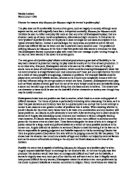Measure for Measure - 'It is comedy and trickery in the play that engages the audience', 'What intereststhe audience about the play is a serious chance to judge its characters'
Liam O’Donnell
“It is comedy and trickery in the play that engages the audience”
“What interests the audience about the play is a serious chance to judge its characters”
What evidence is there in the play to support both views?
What interests and engages you in the play?
There are many aspects of the play that engage and interest the audience, two main aspects being comedy and trickery. There are many characters in the play which contribute to the comedy and trickery which is abundant in the play; in particular Lucio is a character who is often seen as comical due to his lack of restraint in his speech and his ignorance of other characters. He is often associated with bawdy humour but is also associated with noblemen; which brings his character into debate. The main source of trickery which engages the audience is the ‘bed trick’ which is cunningly devised by the Duke, which again brings his and also Isabella’s character into debate.
Lucio is one of the main sources of comedy in ‘Measure for Measure’, his humour and almost careless speech engages the audience which will result in the audience liking his character. His speech on occasions appears to possess no restraint which is evident from his conversation with the two gentlemen when he proudly proclaims ‘I have purchased as many diseases under her roof as come to’. Lucio’s tone suggests the he is proud of this achievement which in turn results in the audience being humoured by Lucio. However Lucio’s proclamation also gives the audience reason for concern as it shows that there is a problem in Vienna with widespread disease. This relates to the outskirts in London in Shakespeare’s era as there were a large number of brothels which resulted in widespread disease.








